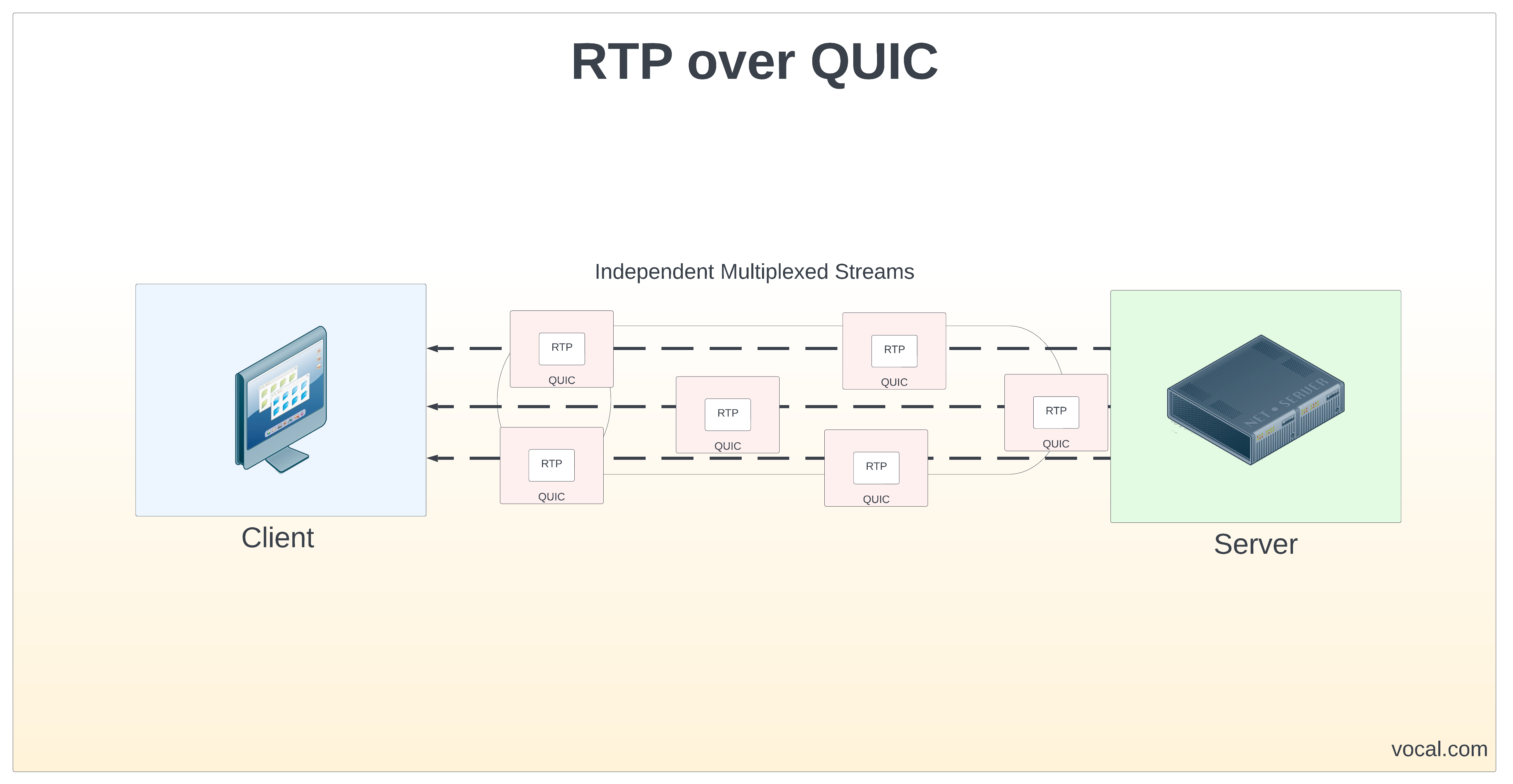What is RTP over QUIC (RoQ)?
RTP over QUIC (RoQ) is a mapping of Real-Time Transport Protocol (RTP) to QUIC Protocol. RoQ allows for a secure encapsulation of RTP packets for transmission over QUIC. RoQ allows QUIC packets to be used in the place of other transport protocols – such as TCP, UDP, SCTP, or DTLS – wherever RTP is being used for real-time media transmissions such as audio, video, and other media/data streams.
RTP over QUIC utilizes QUIC Datagrams and Streams to transport RTP packets as well as QUIC’s multiplexing capabilities. Flow identifiers are used in multiplexing different RTP, RTCP, and non-RTP data streams over a single QUIC connection. Each flow identifier is associated with an independent stream of packets. An RTP session may be associated with multiple flow identifiers and it is therefore possible to send RTP and RTCP packets to the same session using different identifiers. The goal of RTP over QUIC is to establish fast, secure, and reliable transport of real-time media such as audio, video, etc.
- Real-Time Streaming Protocol (RTSP)
- Secure RTP (SRTP)
- Video Streaming Protocols RTP, RTCP and RTSP
- WebRTC
- Session Initiation Protocol (SIP)
What is RTP?
Real-Time Transport Protocol (RTP) is a network protocol used for transmitting audio or video media over a network for playback in real-time. Common uses of RTP are real-time applications such as Voice over IP (VoIP) and video conferencing. RTP allows for the transmission of multimedia streams, including audio and video, and provides features such as sequence numbering, timestamping, and payload identification to ensure that packets are delivered in the correct order and at the right time. RTP is also often used alongside Real-Time Transport Control Protocol (RTCP) for monitoring and control purposes, ensuring the quality of the multimedia transmission.
What is QUIC?
QUIC (not an acronym) is a transport layer network protocol designed to improve network traffic performance by reducing latency and improving security. Developed by Google in 2012, and now standardized by the IETF, QUIC was built on User Datagram Protocol (UDP), allowing for faster connection establishment compared to Transmission Control Protocol (TCP). Every QUIC connection utilizes TLS 1.3 encryption and can additionally support features like multiplexing and improved congestion control to increase packet transmission efficiency.
QUIC’s ability to multiplex multiple independent streams over a single connection improves performance for web browsing, streaming media, and real-time communication. It also includes connection identifiers to quickly adapt to changing network conditions and mitigate some of the impact of packet loss. As a result, QUIC offers faster and more reliable data transmission, making it particularly beneficial for today’s high-speed, low-latency internet applications.
RTP over QUIC (RoQ) Features
- Low latency
- Multiplexing
- Reliable delivery of RTP packets
- Transport Layer Security (TLS) encryption
- Stable connection during network/IP changes for RTP
- RTP encapsulation through QUIC Streams and Datagrams
Custom RTP over QUIC solutions are also available. Contact us to discuss your requirements with our engineering staff.
Related Specifications
- RTP over QUIC (RoQ) – draft-ietf-avtcore-rtp-over-quic-07
- RTP – RFC 1889, 3550, 3551
- RFC 3984 – RTP Payload Format for H.264 Video
- RFC 2250 – RTP Payload Format for MPEG1/MPEG2 Video
- QUIC – RFC 8999, 9000, 9001, 9002

VOCAL’s solution is available for the above platforms. Please contact us for specific supported platforms.
